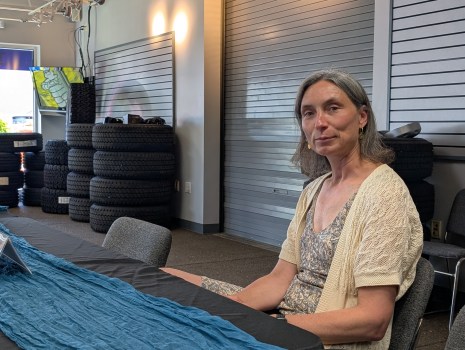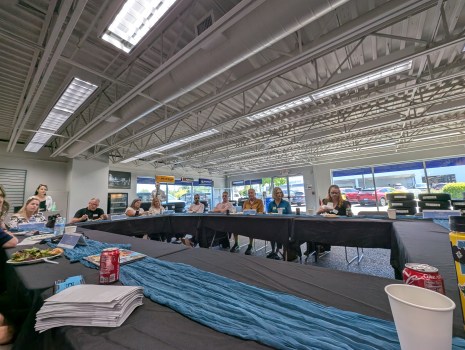Congresswoman Dexter foreshadows impacts of federal budget cuts on rural Oregon
Published 4:26 pm Friday, May 30, 2025
As part of her effort to connect with communities beyond the larger cities in her district, Congresswoman Maxine Dexter visited Sandy on Wednesday, May 28, to meet with business owners and answer questions.
The luncheon she attended was facilitated by the Sandy Area Chamber of Commerce and attended by more than a dozen chamber members.
Over pizza and salad, those members posed questions and concerns ranging in topic from federal legislation with the largest impacts on rural areas and affordable housing to fiscal responsibility at the federal level and term limits.
Dexter, a Democrat representing Oregon’s 3rd District, pointed to the One Big Beautiful Bill Act—a federal spending package recently passed by House Republicans—as one of the most significant developments in Congress that could impact communities like Estacada and Sandy and others across the district.
She highlighted several potential impacts, including proposed cuts to Medicaid, reduced federal support for the Supplemental Nutrition Assistance Program (SNAP), and cuts to contracted firefighter positions—resources that states like Oregon have come to rely on during wildfire season.
One Big Beautiful Bill Act
“Even if no one in this room is on Medicaid, people that work for you probably are,” Dexter explained. “There are definitely folks in this community.”
In March, Dexter visited the Clackamas County Health Center in Sandy, and she said Wednesday that a large population of the patients of that clinic are dependent on Medicaid to have access to healthcare.
“(The clinic) is not sure they’ll be able to survive,” Dexter told those gathered for the chamber lunch. “It is a county clinic, which is helpful, but the county can’t bear the cost for everything they need to build. When we cut Medicaid, we’re hurting access to healthcare for everyone in the community. If clinics close because they don’t have Medicaid to bill, that also means primary care doctors in rural areas are disappearing, and hospitals in rural areas will probably close across the state.”
Preventing those outcomes is top of mind for Dexter at the moment, which is not surprising given Dexter’s long career in healthcare as a physician.
Dexter also discussed the nearly 20% proposed cut to SNAP benefits, saying “Oregon is one of the highest states dependent on SNAP benefits of food assistance.”
“About 20% of those resources are being cut,” she said. “And, as a result, that’s 70,000 families approximately (in Oregon) losing benefits and receiving fewer benefits. $6 a day per person per day, on average, for people who qualify for SNAP benefits, it’s going to go down to $4.20 per person per day. I don’t know anyone who can really get a nutritional balance out of $4.20 a day. Can you even buy a cup of coffee for that right now? So the reality is that families are going to be really hurting. Cost of living is going up and affordable housing is already an issue in Sandy and throughout the district. It’s really going to hurt a lot of our families.”
From a natural resources and infrastructure perspective — Dexter is on the congressional nature resources committee — she reported that while there haven’t been proposed cuts to full-time national Forest Service firefighters, but those contracted firefighters who aid with a surge in incidents during peak seasons have seen cuts. As have those people who facilitate communication for firefighters and do administrative work in the background.
“It’s really going to have huge impacts,” Dexter said. “Right now is when we should be mitigating fire risk and people have just been cut. It’s top of mind for me as a critical care doc, you know. I’ve taken care of people who’ve been exposed to smoke, burns, all those things; from Estacada, I had patients who lost their homes not that long ago in 2020.”
After speaking on the federal spending bill, Dexter commented that while “obviously, I have a political perspective,” she described how she learned to view issues from both sides, having grown up in a politically divided household.
“I think that families are really who we need to be centering, and they’re going to be hurting with the budget bills that we’re passing through right now,” she added, explaining that she doesn’t see that legislation as a “done deal.”
She explained that the One Big Beautiful Bill only barely passed in the House, and it will face revisions in the Senate.
“So, it’s helpful for me to hear what the biggest concerns are for smaller community businesses because this is the bread and butter of America: our mid-sized and small communities,” she said. “Our cities are going to have resources; Sandy’s not going to have the resources to get through things like this if we’re cutting so much.”
Dexter also explained how cuts at the federal level will leave states to shoulder more of the cost of these assistance programs and emergency management.
Revenue forecasting for Oregon shows $750 million less than expected coming in at a time when the cut to Medicaid for the 2027-2029 biennium is proposed to be $1 billion, creating an almost $2 billion budget shortfall.
“We know that schools are underfunded and we have Medicaid gaps that are going to need to be filled and SNAP benefits that are going to need to be filled, but you all know this better than most that the infrastructure is also really struggling,” Dexter said. “The Bull Run Bridge, you can’t run a firefighting rig across it right now, so there’s a 45-minute detour. If there’s a fire up there, are we going to take our chances and pray and go across? Are you going to go around and delay saving people’s homes and buildings? It’s absolutely unacceptable that we haven’t kept our community safe.”
She added that, unfortunately, because “Oregon is a blue state — whether you’re Democrat or Republican — there have been some pointed cuts to blue states’ infrastructure funding.”
“I don’t care who you vote for or what you vote for, (federal) government is meant to do that things that small and local government can’t do for themselves, and we’re not doing it right now,” Dexter said. “We’ve got to take care of people. So your voices and impact is really important, and so is letting me know what you need. I represent all people as a doctor. I’ve never taken care of a Republican or a Democrat; I’ve only taken care of people.”
Even closer to home
In recent years, affordable housing has almost become a buzz phrase in Oregon, and in Sandy as well.
In October 2022, the Sandy City Council put a temporary moratorium on accepting land-use applications requiring new sewer connections in an effort to avoid further DEQ and permit violations while working to update the city sewer system.
This has led to impacts on growth of affordable housing as well as increases to utility rates for residents, which for years were put off.
Both affordable housing and Sandy’s increased water costs came up at the luncheon with Dexter.
One chamber member voiced concern about governmental fiscal responsibility and accountability — not only at the federal level, but the municipal level. He was concerned about the water bill in Sandy increasing.
“I very much believe you need to balance your budget and be accountable,” Dexter responded, noting that the Big Beautiful Bill moving through Congress at the moment would add about $4 trillion to the national debt while giving tax breaks to those who make more than $500,000 a year. “Over 80% of families (in Oregon) are living with their housing costing more than 50% of what they bring in. And that’s the definition of housing insecure.”
She then pivoted back to the Sandy water bill.
“So then let’s talk about the sewer system; you guys can’t build housing because your sewer system (doesn’t have) capacity,” she explained. “So part of what the cost are — I put in many bids for infrastructure (funding) for Sandy, trying to get water treatment and sewer system support — but government hasn’t invested in it. Even though you’re paying a higher tax rate, that’s not where it’s gone.”
And because past Sandy leadership delayed investment into building capacity, upgrading facilities and incrementally increasing utility rates, people in town are seeing larger impacts to their bills now.
Overall, Dexter emphasized the need to refocus on supporting working families.
“We should be centering people and not special interests, but right now we’re centering special interests (at the federal level),” she said. “And that’s the problem. They’re paying for politicians to care about them and not about you.”







